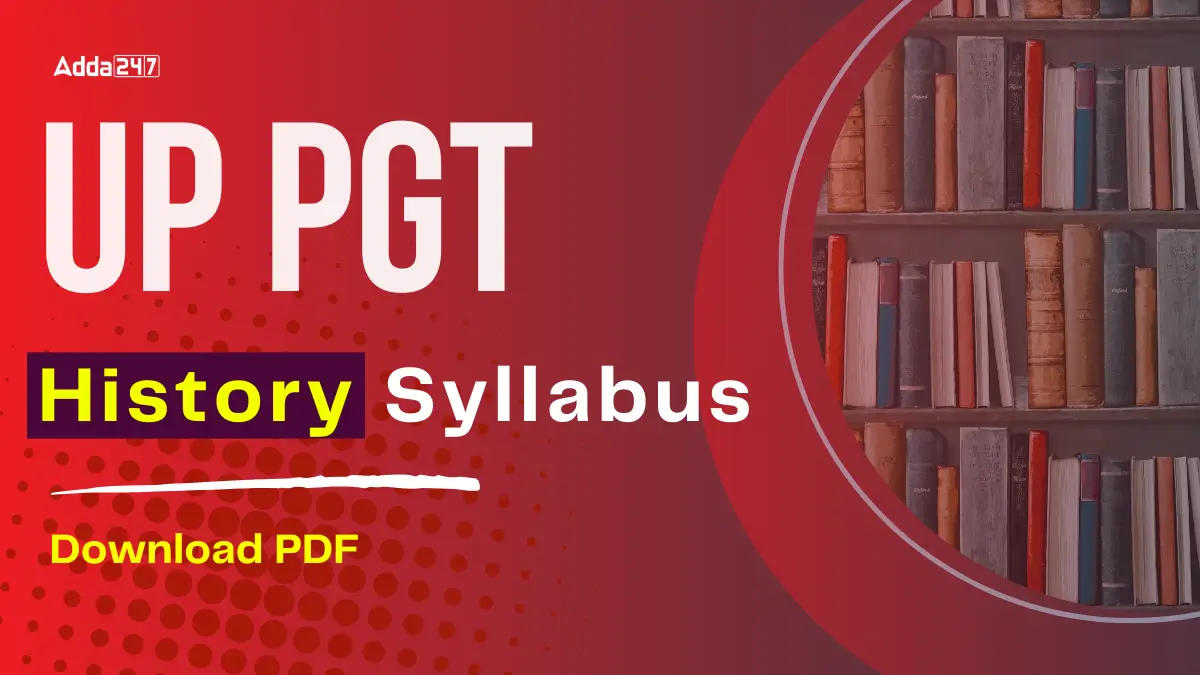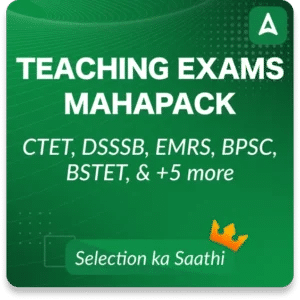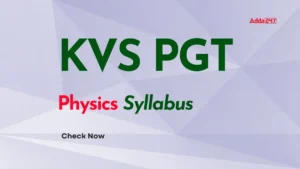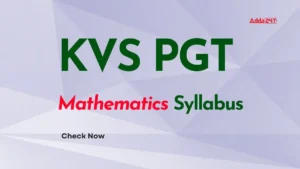Table of Contents
The UP PGT History Syllabus 2025, released by the Uttar Pradesh Secondary Education Service Selection Board (UPSESSB), outlines the key topics for the exam. Candidates must thoroughly review the syllabus to understand the exam pattern, marking scheme, and subject-wise weightage. The syllabus covers Ancient, Medieval, and Modern Indian History, along with World History, Historiography, and Research Methodology. A strong grasp of these topics will help candidates prepare effectively. Read the full article for a detailed breakdown of the UP PGT History syllabus and expert preparation tips.
UP PGT History Syllabus
The UP PGT History Syllabus and Exam Pattern 2025 offer a detailed roadmap for candidates preparing for the Post Graduate Teacher (PGT) History exam. The syllabus includes prehistoric cultures, ancient civilizations, medieval dynasties (Delhi Sultanate, Mughals), and modern Indian history, covering British rule and the freedom struggle. The exam consists of 125 MCQs, each carrying 3.4 marks, totaling 425 marks, with a 2-hour duration and no negative marking. Understanding the syllabus helps candidates prioritize important topics, plan effectively, and improve time management, ensuring a well-rounded preparation strategy.
UP PGT History Syllabus: Overview
The UP PGT History Syllabus 2025, set by UPSESSB, is crucial for candidates aiming to become PGT History teachers in Uttar Pradesh government schools. The recruitment process includes a written exam and weightage-based selection, with 4,163 vacancies announced for TGT and PGT teachers. The PGT History exam is scheduled for 20 June and 21 June 2025. To enhance their chances of success, candidates should thoroughly analyze the syllabus, understand the exam pattern, and adopt a strategic study plan for effective preparation.
| UP PGT History Syllabus | |
| Origination Name | Uttar Pradesh Secondary Education Service Selection Board |
| Name of Post | UP TGT PGT Teachers Exam |
| No. of Vacancy | 4163 |
| Selection Process | Written Exam, Weightage |
| Category | Uttar Pradesh Teacher Syllabus |
| Exam Date for PGT | 20 June -21 June 2025 |
UP PGT History Exam Pattern 2025
The UP PGT History Exam Pattern 2025 comprises 125 multiple-choice questions (MCQs), each carrying 3.4 marks, totaling 425 marks. Candidates will have 2 hours to complete the exam, with no negative marking for incorrect answers. The exam assesses candidates’ knowledge of historical events, socio-political developments, and cultural transformations across various periods. It also evaluates their analytical skills and teaching aptitude, ensuring they meet the requirements for the Post Graduate Teacher (PGT) History role in Uttar Pradesh government schools.
| UP PGT History Exam Pattern 2025 | |
| Total Questions | 125 Multiple-Choice Questions (MCQs) |
| Time Duration | 2 Hours |
| Marks per Question | 3.4 Marks |
| Total Marks | 425 Marks |
| Negative Marking | No |
| Exam Focus | English language, literature, and teaching aptitude |
UP PGT History Syllabus in Detail
The UP PGT History Syllabus 2025 encompasses a detailed study of Indian history, spanning from prehistoric cultures to modern times. Key topics include the Indus Valley Civilization, Vedic Age, Maurya and Gupta Empires, and medieval dynasties like the Delhi Sultanate and Mughals. It also covers religious movements, socio-economic transformations, and administrative developments across different periods. Additionally, the syllabus highlights the British rule in India, the 1857 Revolt, socio-religious reform movements, and the Indian freedom struggle, with a special focus on Mahatma Gandhi’s role. Extending up to post-independence India till 2000, this syllabus provides a comprehensive foundation for aspirants preparing for the PGT History exam.
- Prehistoric Cultures- Paleolithic Age, Mesolithic Age, Neolithic Age, and their key characteristics.
- Indus Valley Civilization– Urban planning, religious life, and social life.
- Vedic Period– Early Vedic and Later Vedic periods – social, religious, economic, and political conditions.
- Religious Movements– Jainism, Buddhism, Bhagavata Dharma, Shaivism, and the contribution of Adi Shankaracharya in the reorganization of Hinduism.
- Maurya Empire– Political history, evaluation of Ashoka, society, and culture.
- Gupta Dynasty– Political history, art, religion, philosophy, and society, economic and social changes during the post-Gupta period.
- Chola Dynasty– Political history, Chola administration, political and social conditions in North India (800 CE to 1200 CE).
- Turkish Invasions– Mahmud of Ghazni, Muhammad Ghori, establishment of the Delhi Sultanate.
- Qutb-ud-din Aibak- Assessment of his achievements.
- Iltutmish- His position among the Sultanate rulers.
- Razia Sultan- Her significance in medieval Indian history.
- Balban- Early challenges, revenue principles.
- Khilji Dynasty- The Khilji revolution and its significance, Alauddin Khilji’s territorial expansion, market control policy, land revenue reforms, Deccan policy.
- Tughlaq Dynasty- Ghiyasuddin Tughlaq’s life and achievements, Muhammad bin Tughlaq’s various schemes and their critical evaluation, Firoz Shah Tughlaq, Timur’s invasion and its impact.
- Bahmani Kingdom, Vijayanagar Empire, Sayyid and Lodi Dynasties.
- Mughal Dynasty– Political, social, economic, and cultural conditions under Babur, Humayun, Akbar, Jahangir, Shah Jahan, and Aurangzeb.
- Decline of the Mughal Empire– Rise of the Marathas, life and achievements of Chhatrapati Shivaji.
- Modern Indian History–
- Arrival of the East India Company in India.
- Political and economic impact of British rule in India.
- Causes, nature, and consequences of the Revolt of 1857.
- 19th-century Renaissance and socio-economic movements – Swami Dayanand Saraswati, Raja Ram Mohan Roy, Aurobindo Ghosh, Annie Besant, and Rabindranath Tagore.
- National Movement and the Freedom Struggle – Contribution of Mahatma Gandhi.
- Independence, Partition of India, and post-independence India till the year 2000.
UP PGT History Syllabus PDF
Candidates should refer to the UP PGT History Syllabus PDF provided in the table below for a structured preparation plan. Reviewing the syllabus before starting will help them identify key topics, understand the exam pattern, and allocate time efficiently. Regularly revisiting the syllabus throughout the preparation phase ensures better retention, focused study, and strategic revision, ultimately improving performance in the exam.
| UP PGT History Syllabus PDF | |
| UP PGT History Syllabus | Download PDF |
| UP TGT PGT 2025 Important Links | |
| UP TGT PGT Notification 2025 | UP TGT PGT Syllabus 2025 |
| UP TGT PGT Previous Year Question Papers | UP TGT PGT Eligibility Criteria 2025 |




 KARTET Syllabus 2025 and Exam Pattern Fo...
KARTET Syllabus 2025 and Exam Pattern Fo...
 KVS PGT Physics Syllabus 2025 and Exam P...
KVS PGT Physics Syllabus 2025 and Exam P...
 KVS PGT Mathematics Syllabus 2025 and Ex...
KVS PGT Mathematics Syllabus 2025 and Ex...














